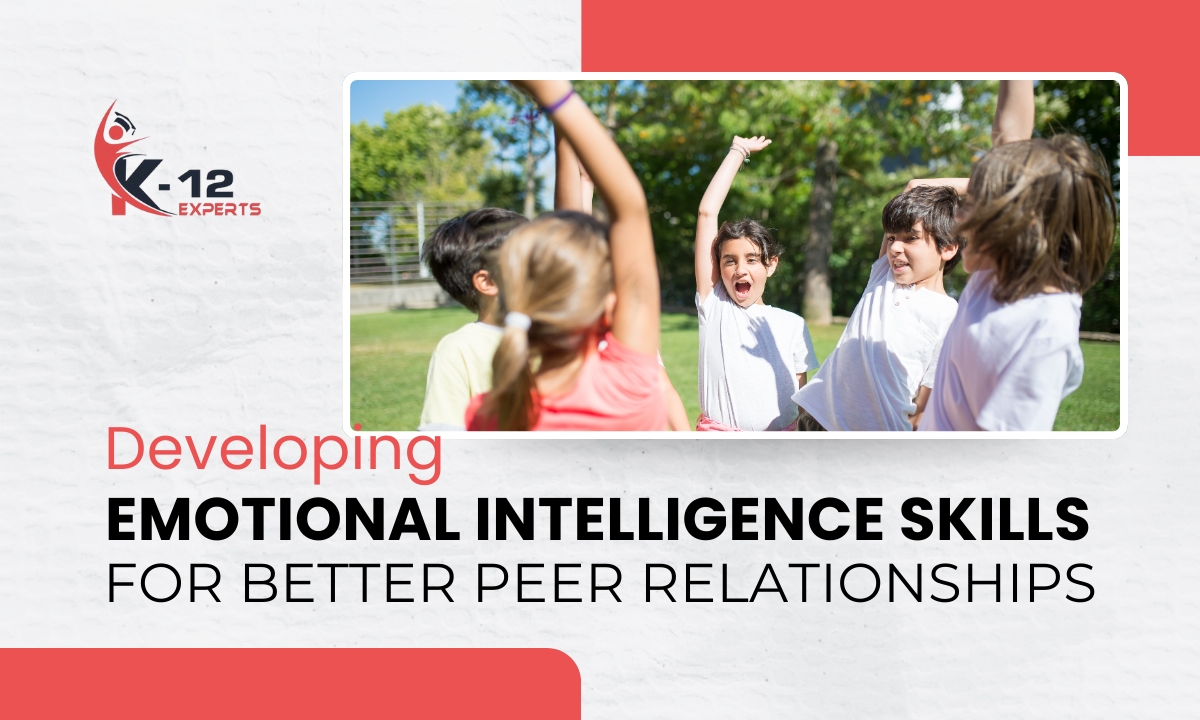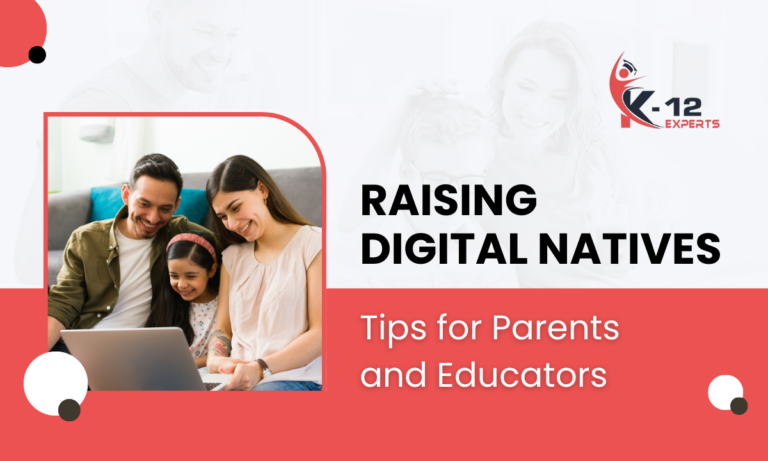Many people don’t realize how much emotional intelligence (EI) can improve their daily interactions. Enhancing your EI skills can strengthen your relationships and increase your confidence and decision-making.
By focusing on essential aspects like self-awareness and empathy, you can create a more positive atmosphere at home and at work.
For example, when you understand your own emotions and can relate to others’ feelings, you communicate better, which can change how you interact with your peers.
Wouldn’t you want to learn how to tap into that potential?
Key Takeaways
- Reflect on your feelings after interactions to better understand your emotional responses.
- Use deep breathing or counting when upset to keep calm and maintain a positive mood.
- Listen actively and validate others’ feelings to build trust and strengthen relationships.
- Encourage teamwork and clear communication with open, inclusive language.
- Use journaling and role-playing to explore and prepare for handling challenging situations calmly.
Understanding Emotional Intelligence
Emotional Intelligence (EI) is an essential skill that helps you understand and manage both your own feelings and the feelings of others. This ability is crucial for creating strong peer relationships because it affects how well you communicate and work together.
When you learn the basics of EI, you can improve your connections with others and create a positive atmosphere, whether at home or at work.
For example, if you notice a friend seems upset, recognizing their emotions allows you to offer support. This can turn a simple conversation into a deeper connection.
What is Emotional Intelligence?
Emotional intelligence (EI) is a valuable skill that helps you manage your feelings and build better relationships. It has four key parts.
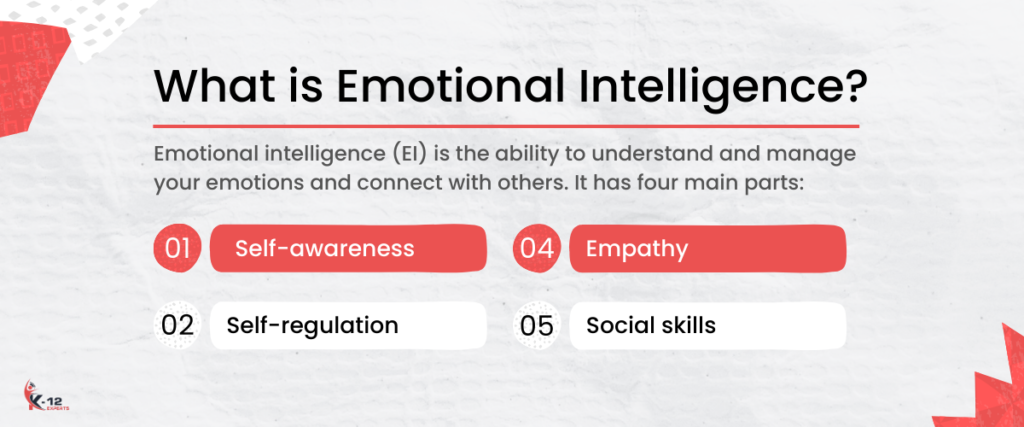
First, self-awareness means knowing how you feel and how those feelings affect what you do. For example, if you’re aware that you feel anxious before a big meeting, you can take steps to calm yourself.
Next is self-regulation. This helps you control your emotions, especially when things get tough. For instance, instead of reacting angrily when someone criticizes you, you can pause and respond calmly.
Empathy is the third part, which involves understanding other people’s feelings. When you empathize, you can connect with friends and family on a deeper level, which strengthens your bonds.
Finally, social skills help you communicate well and create meaningful relationships. This means listening actively and expressing yourself clearly.
Together, these components of emotional intelligence make it easier to interact with others and improve your emotional health.
When you work on developing your EI, you may notice that you make better choices, enjoy stronger relationships, and feel more balanced in your daily life.
The Link Between EI and Strong Peer Relationships
Strong peer relationships depend on emotional intelligence (EI), which is vital for connecting with others. Those with high EI can recognize emotions in themselves and others, fostering trust and improving interactions. This skill aids conflict resolution and enhances teamwork. In schools, students with strong EI often collaborate better and achieve higher academic success.
Let’s break down how EI influences peer relationships:

Understanding and developing emotional intelligence can greatly enhance your relationships with peers, making your interactions more meaningful and effective.
Key Components of EI
To enhance emotional intelligence, focus on self-awareness, self-regulation, empathy, and social skills.
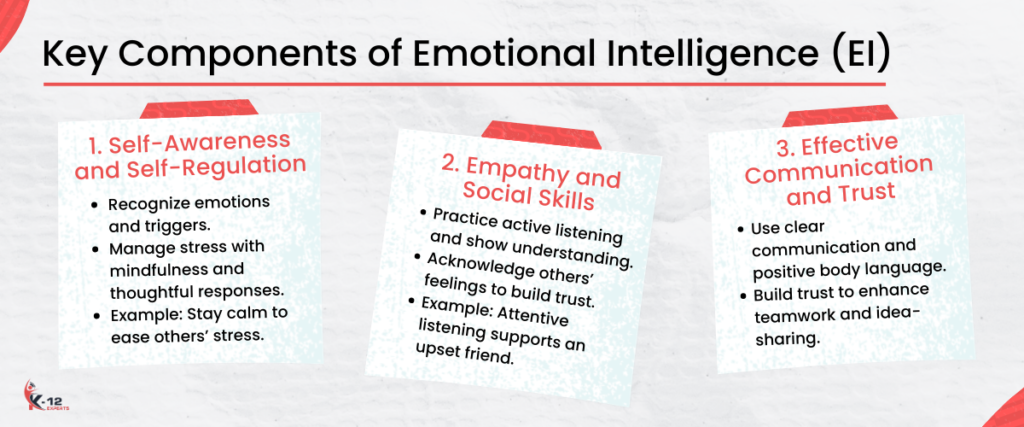
Understanding and managing your own emotions help you connect better with others and handle interactions more effectively.
Self-Awareness and Self-Regulation
Begin by recognizing your emotions and their triggers. Knowing what influences your feelings helps you manage stress and respond thoughtfully. For example, if you feel anxious in group settings, practice deep breathing or prepare conversation topics to ease interactions.
Understanding Your Emotions and Triggers
Awareness of your emotions and triggers is essential for building strong relationships.
When you recognize your emotional responses, you can:
- Find out what causes your feelings.
- See how your emotions influence your actions.
- Get ready for moments that might trigger strong emotions.
- Express your feelings more effectively.
This insight helps improve how you communicate and relate to others.
Managing Stress and Impulses
Mindfulness and deep breathing help you manage stress and think before acting. This approach supports better decision-making, especially in challenging moments, creating a positive atmosphere for those around you.
For instance, staying calm when a friend is stressed can help them feel more at ease.
Empathy and Social Skills
Developing empathy and active listening skills strengthens relationships. Empathy involves understanding others’ perspectives, which builds trust and opens communication.
For example, if a friend shares a difficult experience, showing understanding by responding thoughtfully can deepen your connection.
Cultivating Empathy and Active Listening
Empathy and active listening are important skills that help us connect with others. When you practice these skills, you can:
- Understand how others feel
- Acknowledge their experiences
- Show you’re listening by reflecting back on what they say
- Create a friendly and supportive environment
Being empathetic not only helps you build stronger relationships but also makes the world a better place.
When people feel heard and valued, they’re more likely to share and connect with others. For instance, when a friend is upset, listening to them without interrupting can make a big difference. It shows you care and understand their feelings, which can help them feel less alone.
Practicing these skills can lead to more positive interactions in your everyday life.
Effective Communication and Building Trust
Effective communication and building trust are key parts of strong relationships with your peers. When you speak clearly and use positive body language, you make it easier for others to feel comfortable.
This openness leads to better teamwork and encourages people to express their ideas. By improving your social skills, you not only become more approachable but also create a sense of trust.
This trust is important because it strengthens relationships within your team, making everyone more willing to work together. For instance, when team members feel safe sharing their opinions, it can lead to innovative solutions and a more enjoyable work environment.
Practical Tips for Developing EI
To improve your emotional intelligence, it’s important to practice self-reflection regularly. One effective way to do this is by journaling. Writing about your feelings can help you identify what triggers certain emotions, which in turn boosts your self-awareness.
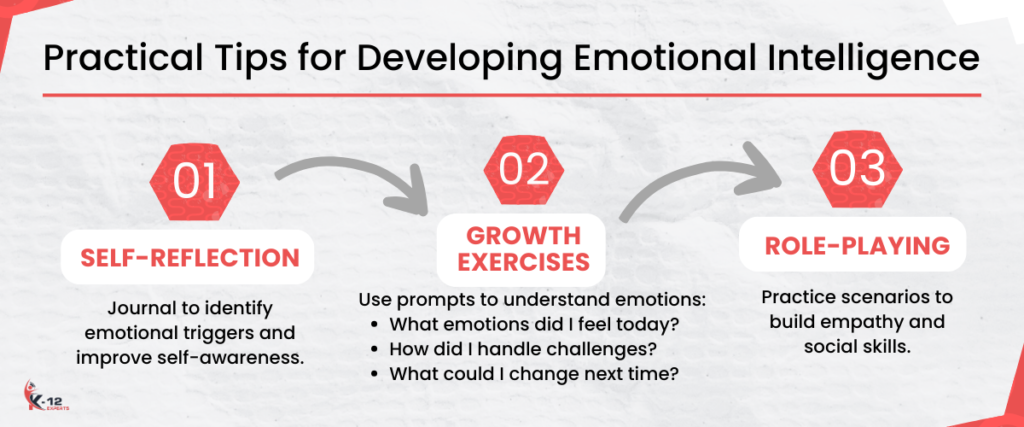
For example, if you notice you often feel anxious in group settings, you can explore why that happens and how to handle it better.
Another helpful technique is role-playing. You can better understand how you might react emotionally by acting out various situations. This practice can prepare you for real-life interactions, making managing your feelings and responding thoughtfully in relationships easier.
Exercises for Self-Reflection and Growth
To improve your emotional intelligence, it’s important to take time for self-reflection through hands-on activities.
For instance, using journaling prompts can help you understand your feelings and what triggers them. You might write about a recent situation that upset you and explore why it affected you that way.
Additionally, practicing role-playing scenarios allows you to rehearse how you’d respond in real-life situations without any pressure.
These exercises aren’t just about building skills; they also help you form better connections with your friends and peers.
Journaling Prompts for EI Development
Journaling can greatly help anyone wanting to improve their emotional intelligence. You can learn more about your actions and reactions by taking time to think about your feelings.
Here are some simple prompts to help you get started:
- What made me feel a strong emotion today?
- How did I handle difficult situations?
- Do I see any common patterns in how I react?
- What could I do differently in similar situations next time?
This process of self-reflection is important because it allows you to understand yourself better and grow emotionally.
Role-Playing for Real-World Scenarios
Role-playing can be a very effective way to boost your emotional intelligence. By acting out real-life situations, you can learn how to deal with disagreements or help friends in need.
This practice helps you build empathy and social skills. It also provides a safe environment where you can try out different approaches, make mistakes, and get helpful feedback.
This process helps you better understand and apply emotional intelligence in your daily interactions. For example, you might role-play a situation where a friend is upset, allowing you to practice listening and offering support in a caring way.
The Long-Term Benefits of EI
Building emotional intelligence (EI) can bring many lasting benefits that significantly improve your life. When you work on your EI skills, you won’t just get by; you’ll truly flourish in different areas of your life.
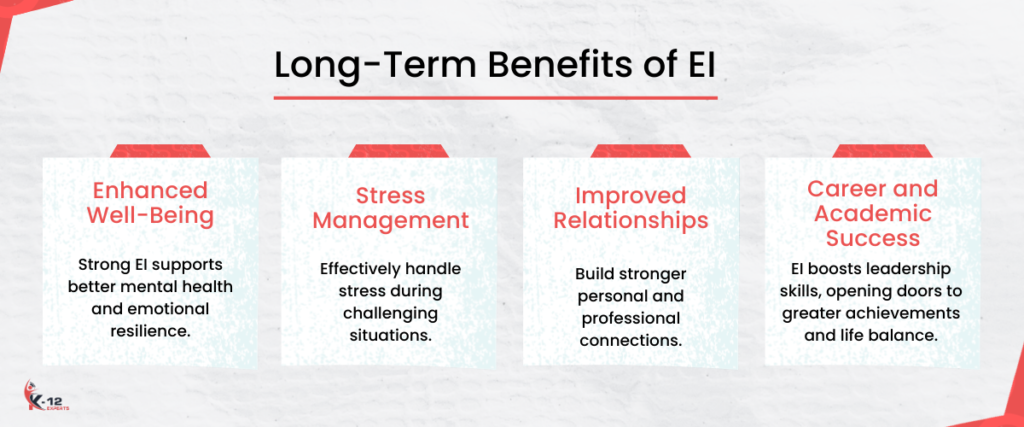
Here are some key benefits you can expect:
- Better mental health and stronger emotional resilience
- More effective stress management during tough times
- Improved relationships both personally and professionally
- Greater success in school and your career
Strong emotional intelligence helps you navigate life’s challenges, inspire others, and foster a positive environment.
Developing EI prepares you for leadership roles and leads to a more satisfying and balanced life, opening up new possibilities.
Frequently Asked Questions
Can Emotional Intelligence Be Measured Objectively?
Measuring emotional intelligence is challenging because it often relies on self-assessment or peer feedback, which can introduce bias. Objective measurement tools are limited, as emotional intelligence involves subjective experiences. However, understanding emotional intelligence is beneficial for personal development, as managing emotions can improve relationships and decision-making.
How Does Culture Affect Emotional Intelligence Development?
Culture significantly shapes emotional intelligence by influencing how people express and interpret emotions. Some cultures encourage open emotional expression, while others prefer restraint. Recognizing cultural differences in emotional expression enhances empathy and helps build stronger connections, as it enables more culturally sensitive responses.
Are There Age-Related Differences in Emotional Intelligence?
Yes, emotional intelligence often improves with age. Older adults tend to manage emotions better, often displaying increased empathy and understanding due to accumulated life experiences. This growth shows that emotional skills can develop over time, highlighting the importance of reflection and personal experiences in enhancing emotional intelligence.
Can Emotional Intelligence Be Improved Through Therapy?
Therapy can effectively enhance emotional intelligence by providing a space to explore and understand emotions. For example, therapy can improve empathy by helping individuals recognize others’ feelings. This self-awareness and emotional management growth promotes healthier, more meaningful interactions and relationships.
What Role Does Empathy Play in Emotional Intelligence?
Empathy is crucial to emotional intelligence, as it allows people to understand and share others’ emotions, creating trust and stronger relationships. Non-verbal cues like body language and tone make up much of communication, underscoring empathy’s importance. By being empathetic, individuals foster an environment where others feel safe to share, strengthening bonds and promoting open, honest communication.

